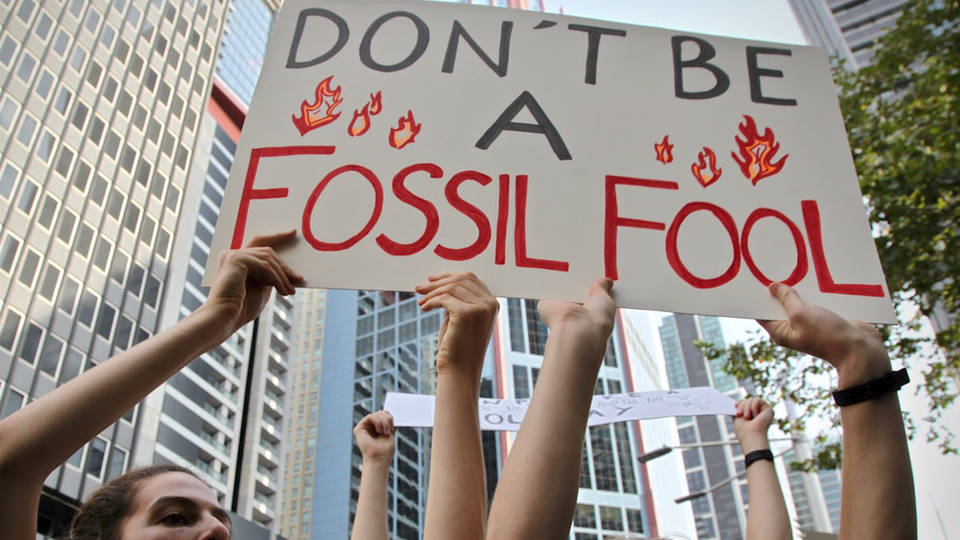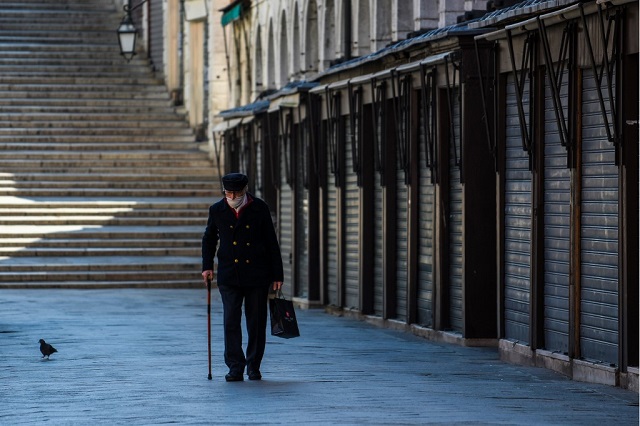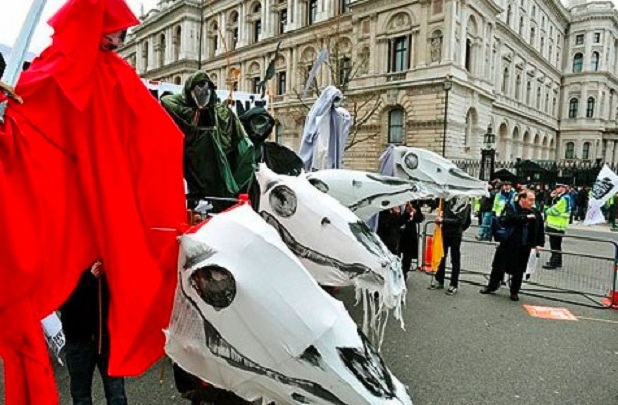In the second and final part of his essay on Mikhail Bakhtin, political theorist Andrew Robinson reviews, and critiques, one of the central concepts in the Russian thinker's work: the Carnivalesque.
On International Worker's Day , Saturday 1st May 2010,
the Four Horsefolk of the Post-Capitalist Apocalypse.
By Andrew Robinson
In the second and final part of his essay on Mikhail Bakhtin, political theorist Andrew Robinson reviews, and critiques, one of the central concepts in the Russian thinker’s work: the Carnivalesque.
Carnival and carnivalesque
In Rabelais and his World, Bakhtin discusses carnivalesque (or ‘folk-humour’,) a particular speech-genre which occurs across a variety of cultural sites, most notably in carnival itself.
A carnival is a moment when everything (except arguably violence) is permitted. It occurs on the border between art and life, and is a kind of life shaped according to a pattern of play. It is usually marked by displays of excess and grotesqueness. It is a type of performance, but this performance is communal, with no boundary between performers and audience. It creates a situation in which diverse voices are heard and interact, breaking down conventions and enabling genuine dialogue. It creates the chance for a new perspective and a new order of things, by showing the relative nature of all that exists.
The popular tradition of carnival was believed by Bakhtin to carry a particular wisdom which can be traced back to the ancient world. For Bakhtin, carnival and carnivalesque create an alternative social space, characterised by freedom, equality and abundance. During carnival, rank (otherwise pervasive in medieval society) is abolished and everyone is equal. People were reborn into truly human relations, which were not simply imagined but experienced. The body is here figured not as the individual or ‘bourgeois ego’ but as a growing, constantly renewed collective which is exaggerated and immeasurable. Life manifests itself not as isolated individuals but as a collective ancestral body. This is not, however, a collective order, since it is also continually in change and renewal. The self is also transgressed through practices such as masking.
Carnival is a kind of syncretic, ritualised pageantry which displays a particular perspective. It is a brief moment in which life escapes its official furrows and enacts utopian freedom. It is a form of life at once real and ideal, universal and without remainder. Its defining feature is festivity – life lived as festive. It is also sanctioned by the highest ideal aims of human existence, not by the world of practical conditions.
Carnival is also taken to provide a positive alternative vision. It is not simply a deconstruction of dominant culture, but an alternative way of living based on a pattern of play. It prefigured a humanity constructed otherwise, as a utopia of abundance and freedom. It eliminated barriers among people created by hierarchies, replacing it with a vision of mutual cooperation and equality. Individuals are also subsumed into a kind of lived collective body which is constantly renewed.
On an affective level, it creates a particular intense feeling of immanence and unity – of being part of a historically immortal and uninterrupted process of becoming. It is a lived, bodily utopianism distinct from utopianisms of inner experience or abstract thought, a ‘bodily participation in the potentiality of another world’. The golden age is lived, not through inner thought or experience, but by the whole person, in thought and body.
An emphasis is placed on basic needs and the body, and on the sensual and the senses, counterposed perhaps to the commands of the will. It lowers
the spiritual and abstract to the material level. It thus recognises embodiment, in contrast with dominant traditions which flee from it.
Prefiguring James Scott’s analysis of ‘hidden transcripts’, Bakhtin portrays carnival as an expression of a ‘second life’ of the people, against their subsumption in the dominant ideology. Ir replaces the false unity of the dominant system with a lived unity in contingency. It creates a zone in which new birth or emergence becomes possible, against the sterility of dominant norms (which in their tautology, cannot cretae the new). It also encourages the return of repressed creative energies. It is joyous in affirming that the norms, necessities and/or systems of the present are temporary, historically variable and relative, and one day will come to an end.
Reading this in a contemporary way, we might say that carnival is expressive rather than instrumental. It involves the expression of latent aspects of humanity, direct contact among people (as opposed to alienation), and an eccentric refusal of social roles. It brings together groups and categories which are usually exclusive. Time and space are rearranged in ways which show their contingency and indissolubility. All of this is done in a mood of celebration and laughter.
In carnival, everything is rendered ever-changing, playful and undefined. Hierarchies are overturned through inversions, debasements and profanations, performed by normally silenced voices and energies.
For instance, a jester might be crowned in place of a king. The authoritative voice of the dominant discourse loses its privilege. Humour is counterposed to the seriousness of officialdom in such a way as to subvert it.
Carnival bridges the gap between holism (which necessarily absorbs its other) and the imperative to refuse authority (which necessarily restores exclusions): it absorbs its authoritarian other in a way which destroys the threat it poses. It is also simultaneously ecological and social, absorbing the self in a network of relations. Bakhtin insists that it opposes both ‘naturalism’, the idea of a fixed natural order, and ideas of fixed social hierarchies. It views ecology and social life as relational becoming. Perhaps a complete world cannot exist without carnival, for such a world would have no sense of its own contingency and relativity.
Although carnival succeeded in undermining the feudal worldview, it did not succeed in overthrowing it. Feudal repression was sufficient to prevent its full utopian potential from unfolding. But it is as if it created a space and bided its time. Bakhtin suggests that it took the social changed of the Renaissance era (the 15th-16th centuries) for carnival to expand into the whole of social life. The awareness of contingency and natural cycles expanded into a historical view of time. This occurred because social changes undermined established hierarchies and put contingency on display. Medieval folk culture prepared the way for this cultural revolution.
Bakhtin almost portrays this as a recuperation of carnivalesque: it was separated from folk culture, formalised, and made available for other uses. Yet Bakhtin portrays this as a positive, creative process which continues to carry the creative spirit. Bakhtin suggests that carnival and folk culture have been in decline since the eighteenth century.
Carnivals have turned into state-controlled parades or privatised holidays, humour and swearing have become merely negative, and the people’s ‘second life’ has almost ceased. However, Bakhtin believes that the carnival principle is indestructible. It continues to reappear as the inspiration for areas of life and culture. Carnival contains a utopian promise for human emancipation through the free expression of thought and creativity. Rabelais stands out here for a style which is irreducibly unofficial and unserious, and irrecuperable by authoritarianism.
Carnival and the Grotesque

Carnivalesque images often use an approach Bakhtin terms ‘grotesque realism’, drawing on
the idea of the grotesque. This style transgresses the boundaries between bodily life and the field of art, bringing bodily functions into the field of art. It also celebrates incompleteness, transgression and the disruption of expectations. It often performs a kind of symbolic degradation aimed at bringing elevated phenomena ‘down to earth’ – to the material, bodily or sensuous level.
This was not conceived as an absolute destruction but as a return to the field of reproduction, regeneration and rebirth. The spirit of carnival was personified as a fat, boisterous man who consumed vast quantities of food and alcohol – similar to Dickens’ Ghost of Christmas Present.
The carnival body is seen as transgressing and outgrowing its own limits. This effect is achieved by emphasising the orifices and practices which connect the body to the world: eating, drinking, fucking, shitting, birth, and so on.
This is viewed as a kind of “materialism”. The “material” in this excessive, consumptive, reproductive and bodily sense must be contrasted with the material conceived in terms of privatisation and accumulation, as well as in contrast to its medieval adversary, the spiritual or ‘higher’ plane.
In capitalism, the body breaks away from the generating earth and people. Later uses of grotesque realism in literature tend to lose the universalist and holistic implications of the folk view of the body. Instead of finished forms, the different forms of life – animal, plant, human – are portrayed as incomplete and as passing into one another (think, for instance, of gargoyles with mixed human-animal features. This testifies to a view of being as incomplete).
Bakhtin believes that the grotesque is counterposed to the classical aesthetic of ready-made, completed being. The carnivalesque body in contrast expressed ideas of simultaneous death and rebirth. It is counterposed to the classicist idea of art as the pursuit of the sublime.
In medieval times, Bakhtin believes, carnival expressed an entire folk cosmology or perspective which was usually hidden. In this worldview, the earth itself is a kind of grotesque, fertile body. Laughter, counterposed to the monolithically serious official world, is also part of this phenomenon. There is also a vision of time involved, which treats the new and the future as sites of regeneration and abundance.
This contrasts with official ideas of a past ideal time or a timeless order.
The dominant worldview of medieval Europe was of a natural order which is hierarchical, stable, monolithic and immutable, but poised on the brink of disaster or ‘cosmic terror’, and hence in need of constant maintenance of order. This is similar to
Aristotle’s view. For Bakhtin, such a view is oppressive and intolerant. It closes language to change.
The fear of ‘cosmic terror’, the pending collapse of order if things got out of control (or the threat posed by the Real to the master-signifier), was used by elites to justify hierarchy and to subdue popular revolt and critical consciousness. Today, we might think of this vision of monolithic order in terms of fantasies of ‘broken Britain’, of civilisation under siege from extremists, and a discourse of risk-management (and the crisis-management of ‘ungovernability’) in which ‘terrorism’, disease, protest, deviance and natural disaster fuse into a secularised vision of cosmic collapse.
This vision of collapse has infiltrated legal and political discourse to such a degree that any excess of state power seems ‘proportionate’ against this greater evil.
The folk view expressed in carnival and carnivalesque, and related speech-genres such as swearing and popular humour, opposes and subverts this vision. For Bakhtin, cosmic terror and the awe induced by the system’s violent power are the mainstays of its affective domination. Folk culture combats the fear created by cosmic terror.
The celebration of the immortal collective body in carnival bolsters fearlessness. The amorphous fears are brought ‘down to earth’ through parody and degradation, turned into something worldly which can be overcome, stripped of its metaphysical pretensions. It tends to produce a complete liberty conditioned on complete fearlessness.
Against the timeless force of becoming, the pretensions of serious officials and rulers, and even of one’s own serious self and ego, seem irrelevant and comical. Laughter overcomes fear because it is uninhibited and limitless. Carnival is differentiated from other kinds of humour because the crowd also includes itself in the world which is mocked, and which is reborn.
Curses, parody and debasing are used to subvert the stabilising tendencies of dominant speech-genres. Today’s swearing retains only the remainders of this culture, since it keeps only the destructive and not the reproductive elements. Still, its continuing attraction shows that it carries the remnants of the energy of folk culture and carnival.
The culture of the ‘marketplace’ also figures in Bakhtin’s account of carnival. In contrast to today’s use of the ‘market’ to signify official discourse, the medieval market was a site of transgressive discourse. This may explain how the rising capitalists were able to use references to the market to hegemonise popular strata.
Today, a genre similar to carnivalesque appears in shows such as
South Park and
Monty Python. The grotesque also remains widespread in various fields of art, and
many examples can be found.
It is, however, against Bakhtin’s method to treat all instances of carnivalesque or grotesque as equivalent to their historical precedents. Everything must be re-examined as a product of its own context. Today’s Bakhtinians often read such phenomena in directly Bakhtinian terms. It is likely, however, that Bakhtin would have seen in them a pale, individualised and spectacularised shadow of the original culture of carnival. He would nevertheless recognise that they contain some of the energy of the original.
Carnival and Contingency: Bakhtin’s Place in Critical Theory
Carnival in Bakhtin’s account is a kind of de-transcendence of the world, the replacement of the fixed order of language – held in place by a master-signifier or ‘trunk’ – with a free slippage of signifiers in a space of immanence. The contingency of being/becoming can be embraced as an ecstatic potential, but it can also figure in literature as a horrifying monstrosity, as in the works of HP Lovecraft, and more broadly in the horror genre.
Does this express an unconscious longing for carnival which is at the same time disturbing to other layers of the psyche? We are here in the field of the dispute between affirmative theories of contingency (such as Bakhtin, Nietzsche, Negri, Deleuze, and Bey) against negative theories of contingency for which the openness of the ‘Real’ or the finitude and contingency of existence is always threatening (a repetition of the ‘cosmic terror’ Bakhtin critiques, ranging from Schmitt, Burke and Hobbes to Heidegger, Lacan and Laclau).
Why is contingency not universally celebrated, in a carnivalesque spirit? According to Reich, active force becomes threatening through being associated, as a result of authoritarian conditioning, with repressed desires and fear of authority. There are also questions of the effects of carnivalesque decomposition on one’s own ego or sense of self, on identities, and on habitual social practices or familiar spaces.
Theories with an affirmative view of contingency tend to share with Bakhtinian carnival a belief in an eternal creative force which unfolds in difference – active force in Deleuze and Nietzsche, constitutive power in Negri, the instituting imaginary in Castoriadis and so on. Theories with a negative view, in contrast, believe in an eternal need for order which is constantly threatened by the contingent nature of existence. The establishment of order occurs with the decision, the master-signifier and so on.
Between these positions, a lot depends on whether the ‘evil’ of disorder is sufficient to outweigh the effects of repression. It seems to do so only from the standpoint of the privileged. From the standpoint of the excluded, it just makes things worse: the excluded are left with both disorder and repression.
Bakhtin’s challenge is deeper than this, however. Bakhtin believes ‘disorder’ can be affirmative. For Bakhtin, immanence is non-threatening because it is associated with the dialogical nature of language. Because networks and connections continue to be performed in a space of dialogical immanence, the loss of transcendence is not a loss of meaning, life, or social being.
This reverses the Hobbesian account: rather than social death ensuing from the chaos of the collapse of meaning, social death is an effect of the artificial separation, rigidity and silencing which result from transcendence. As Benjamin has argued, disaster is not waiting on the edge of existence; the present is the disaster.
Authors such as Michael Holquist reduce the radicalism of Bakhtin’s immanence by suggesting that monologue remains necessary to his thought, as the point against which transgression occurs. Bakhtin certainly takes aspects of language-use such as speech-genres and the self-other gap to be universal, but he affirms the possibility of a radically different type of genre which is open to its own deconstruction.
Each person necessarily has a perspective or frame, but these frames do not need to be unified, nor are they necessarily unchanging. A rhizomatic world such as carnival has its perspectives, frame, and patterns. It does not engender an existentialist ‘lightness of being’.
But, precisely because these patterns are dissensual, holistic, reflexive, consciously relative and situated, they create a kind of freedom. This is neither a repetition of monologue, nor its redemption through recognition of its own contingency. It is an entirely different perspective in which dialogue and immanence are actualised.
Bakhtin’s account of carnival is criticised by some authors, such as Max Gluckman, Victor Turner and Roger Sales, for ignoring carnival’s temporary character. For such critics, carnival is a kind of safety-valve through which people let off steam. It ultimately sustains and is functional for the dominant system. It might even reinforce dominant values by contrasting them with their opposites. James Scott responds that, if this were the case, the powerful would be more sympathetic to carnival than was actually the case. Also, carnivals did, in fact, sometimes pass over into rebellion. And rebellions often used symbolism borrowed from carnival.
It should be added, however, that not every carnivalesque act is emancipatory, because sometimes, it can disinhibit reactive desires arising from the system. Bakhtinian theory is sometimes used to defend texts which arguably reproduce dominant values, but do so in
an ‘ironic’ or ‘humorous’ way. This happens because of the layers of prohibitions: the system often promotes something (such as sexism), then inhibits its unconstrained expression.
Hierarchies were perhaps simpler in medieval times. We get into complexities today around the distinction between ‘true’ transgressions and those which repeat dynamics of the system at a deeper level. The system can use such ‘false’ transgressions to channel the carnivalesque into its own reproduction. Consider, for instance, how the transgressiveness of football culture has been displaced into
the fascism of the EDL.
The tendencally resistant space of fan culture, by being displaced through repression, is turned into the pseudo-transgression of performative racism. At one level, racial abuse is transgressive (of liberal norms), but on another, it reproduces dominant structures (of underlying racism).
Such displays are similar to true carnival in their excess and expressiveness, but they ultimately uphold the transcendentalism of the in-group through transgressions which reinforce their privilege at the expense of an out-group. This is especially clear from Theweleit’s work: reactionaries and fascists are terrified of being overwhelmed by the ‘floods’ and ‘bodies’ of interpenetration with the other, though they must constantly return to the point of the threat of interpenetration so as to ward it off.
If carnival brings down to earth, its rightist transmutation plants heads firmly in clouds, making the self feel secure in its place by putting the other in her/his place. It belittles the other and not the self; or it belittles both, but in such a way as to keep the gap between them.
Carnivalesque Activism
The carnivalesque style of activism emphasises the deconstruction of relations, including those between activists and police, to create an uncontrollable space. Such tactics can be
remarkably successful in disorienting and repelling the monologists of state power.
Abby Peterson’s studies of the ethnography of militant social movements emphasise an affective structure similar to Bakhtin’s carnival. The experience of lived immediacy and joy is constructed through a movement orientation to the enacted event with no separation between actor and audience. This serves as a means to integrate movements without reference to standard techniques of master-signification, though it does require ‘action spaces’ and in many cases adversaries. Peterson echoes Bakhtin’s idea of the immediacy of activist ‘rituals’ as something distinct from theatre or spectacle. David Graeber makes
similar reference to puppetry and creativity in protets movements.
Figures of carnivalesque immediacy can also be found in authors such as Hakim Bey and Feral Faun. One can also liken Bakhtin’s view of creating new combinations with Situationist practices of
derive and detournement.
Similar strategies can also be seen in social movements such as
La Ruta Pacifica, who use techniques of ‘social weaving’ to recompose a sense of empowerment against the fear caused by civil war and state terror. Much of the state’s power is based on anxiety. The Bakhtinian hypothesis is that anxiety can be neutralised through joyous experiences of collective festivity.
These occasions strip power of its performed mystification, breaking into its ideological reproduction. They show its contingency by exposing it to ridicule and distortion. And they create a sense of counter-power through the permanence of the creative force of becoming, counterposed to the fixed order of being. It doesn’t so much confront state power as render it irrelevant and ineffectual.
Whether this is effective may depend on the tools the two sides have available to actualise their ideologies in spaces and practices. State tactics such as
kettling are specifically designed to instil terror, as an antidote to joy. The popular culture which provided the basis for carnival is, in the most harshly capitalist countries, being destroyed by the penetration of the state into everyday life.

It persists, of course, in many marginal settings. We should remember here that the Europe Bakhtin discusses was itself a periphery in a world-economy focused on the Mediterranean. It is perhaps unsurprising, therefore, that its modes of resistance look like those of marginal sites today.
Reclaiming contingency and carnival in the dead heartlands of the core, where people are strongly invested in their official identities and the preservation of an order which they believe protects them, is a more difficult task.
Traditional carnivals continue to exist in places ranging from Germany and Notting Hill, London to the Caribbean and Brazil. Other related phenomena, such as holi in India, also persist. While state regulation is a problem, such events still provide platforms for alternative visions and for political critique.
One can also point to carnivalesque aspects in practices such as graffiti, which may bring ‘down to earth’ such contemporary sacred as
police cars, banks, or
corporate logos. And why do children so often add giant willies, sex-acts, or swear-words to
street-signs?
The grotesque, exaggerated body and the bringing down-to-earth of systemic abstractions are present even in such small, apparently apolitical gestures. They signify what is missing in the official picture – much as those who perform such acts are often excluded from the official world. They create a full reality in which the world is restored to its fullness and creativity.
Overall, therefore, carnivalesque remains a potential counter-power in everyday life and activism, but is ‘cramped’ in its potential by the repressive construction of spaces of monologue. Medieval carnival was possible because the spaces it inhabited could be carved-out and defended through the ‘arts of resistance’ and the power of the weak. There is a need to recompose such powers to resist, in order to recreate spaces where alternatives can proliferate.






 Carnivalesque images often use an approach Bakhtin terms ‘grotesque realism’, drawing on
Carnivalesque images often use an approach Bakhtin terms ‘grotesque realism’, drawing on  It persists, of course, in many marginal settings. We should remember here that the Europe Bakhtin discusses was itself a periphery in a world-economy focused on the Mediterranean. It is perhaps unsurprising, therefore, that its modes of resistance look like those of marginal sites today.
It persists, of course, in many marginal settings. We should remember here that the Europe Bakhtin discusses was itself a periphery in a world-economy focused on the Mediterranean. It is perhaps unsurprising, therefore, that its modes of resistance look like those of marginal sites today.